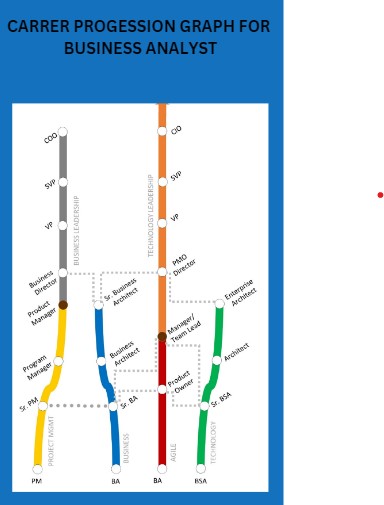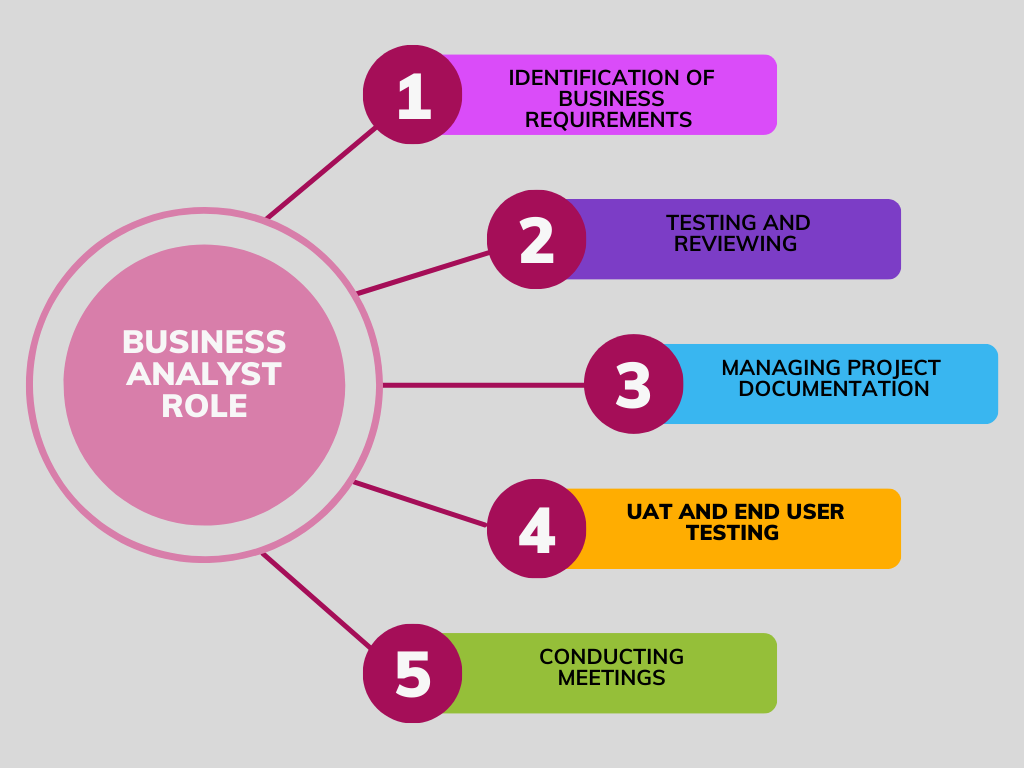Introduction
In the contemporary business landscape, organizations across all sectors increasingly rely on data to drive strategic decision-making and operational effectiveness. This amplifies the demand for professionals who can bridge the gap between the IT department and business units: the Business Analysts. These professionals can leverage data to evaluate business processes, identify needs, and deliver actionable insights. This comprehensive guide explores the journey of becoming a Business Analyst, providing an understanding of the role, necessary skills, educational background, and potential career progression.
- Understanding the Role of a Business Analyst
- Education for a Business Analyst
- Certifications for a Business Analyst
- Essential Skills for a Successful Business Analyst
- Day to Day life of a Business Analyst
- Climbing the Ladder: Career Growth and Progression
- The Power of Networking
- Industries that demand Business Analysts
- Conclusion
- Frequently Asked Questions
Understanding the Role of a Business Analyst
A Business Analyst’s job is as diverse as it is essential. They ensure that business needs are met effectively and efficiently, often advocating for changes in policy, improvements in existing processes, and implementation of new systems. Business Analysts are the bridge connecting various stakeholders from executives to IT professionals, facilitating communication and driving the business toward its strategic goals.
Key Responsibilities of a Business Analyst
- Identifying and defining business needs and solutions.
- Analyzing and interpreting data to provide actionable insights.
- Facilitating communication between various stakeholders.
- Implementing, monitoring, and improving business processes.
- Providing training and support as necessary.
Education for a Business Analyst
While there is no specific degree that exclusively leads to a career as a Business Analyst, certain educational backgrounds can provide a strong foundation. Degrees in business administration, economics, finance, information technology, and related fields often prove beneficial. Additionally, certain professional certifications can significantly bolster a candidate’s credentials.
Certifications for a Business Analyst
| Degree | Relevance |
| Business Administration | Provides an understanding of business operations and strategy |
| Economics | Offers insights into market trends and economic principles |
| Finance | Delivers knowledge of financial management and budgeting |
| Information Technology | Equips with the technical know-how necessary for the role |
Noteworthy Certifications
- Certified Business Analysis Professional (CBAP) from the International Institute of Business Analysis (IIBA).
- Certification of Competency in Business Analysis (CCBA).
- Specialized certificates in tools like SQL, Python, Tableau, and Power BI.
By pursuing one or a combination of these degrees, you can set yourself up for success as a Business Analyst. Each degree brings valuable insights and expertise that complement the role’s demands, empowering you to make data-driven decisions and contribute significantly to a company’s growth and success.

Degrees and certifications for Business Analyst
Essential Skills for a Successful Business Analyst
Besides educational qualifications, certain skills are indispensable for a Business Analyst. The nature of the job demands a well-rounded skill set encompassing technical, business, and interpersonal skills.
- Analytical Thinking: Business Analysts are problem solvers. They analyze complex business problems and devise efficient solutions.
- Communication Skills: They must articulate complex information clearly to various stakeholders.
- Understanding of Business Structure and Strategy: An in-depth understanding of business operations is crucial to optimize processes and drive strategic decision-making.
- Technical Proficiency: Familiarity with data analysis tools and software, such as SQL, Python, Tableau, and Power BI, is highly valuable.
Day to Day life of a Business Analyst
The daily responsibilities of a Business Analyst can vary significantly depending on the industry, the specific company, and the current project they are working on. However, here’s a general idea of what a day in the life of a Business Analyst might look like:
Morning:
- Start the day by checking and responding to emails. There may be updates from different stakeholders or teams that will impact the work for the day.
- Attend a morning stand-up or team meeting. This is an opportunity to discuss the status of ongoing projects, upcoming deliverables, and any roadblocks that might need to be addressed.
- Review any new data that’s come in or updates to ongoing analysis. This could include looking at customer data, sales reports, operational metrics, or other key performance indicators (KPIs) relevant to the business or project.
Mid-Day:
- Meet with department heads or team leaders to understand their needs and challenges. The goal is to understand their perspective and gather requirements for any new systems or process changes that are needed.
- Work on documenting these requirements and analyzing potential solutions. This could involve creating flowcharts, wireframes, or use cases to outline how new systems or processes would work.
- Eat lunch. Even busy Business Analysts need to refuel!
Afternoon:
- Conduct a workshop or training session to explain new systems or changes to existing ones. This might include presenting a proposal to senior leadership or training staff members on how to use a new piece of software.
- Continue work on data analysis. This could involve using statistical software to analyze data, creating reports or dashboards to visualize the data, or using the findings to make recommendations for business improvements.
- Check-in with the IT department or any other teams involved in implementing the business improvements. Ensure they have all the information they need and address any questions or concerns they might have.
Evening:
- Wrap up the day by updating project management tools with the progress made during the day.
- Prepare a to-do list for the next day. Business Analysts often juggle multiple projects or tasks at once, so staying organized is key.
- Before signing off, they might take some time for professional development. This could be reading up on the latest industry trends, taking an online course, or networking with other professionals in the field.
Remember, no two days are the same for a Business Analyst. They need to be adaptable and ready to tackle new challenges as they come. It’s a dynamic role that offers plenty of variety and opportunities to make a significant impact on the business.
Climbing the Ladder: Career Growth and Progression
A career in business analysis doesn’t end at being a Business Analyst. With experience, one can progress to roles such as a Senior Business Analyst, Business Consultant, Project Manager, or even Business Intelligence Analyst. Moreover, the increasing emphasis on data in business decisions makes this career a stepping stone for roles in Data Science or Data Analytics.

Career Progression chart For Business Analyst
The Power of Networking
Networking is an important yet often overlooked aspect of building a career. Connecting with professionals in the field can provide first-hand insights, guidance, and potential job opportunities. Join professional associations like the IIBA, attend industry conferences, or participate in online communities and forums dedicated to business analysis.
Examples of real-life scenarios that Business Analysts might do:
- Improving Customer Service in a Telecom Company: A telecom company was receiving numerous customer complaints regarding service disruptions and billing issues. The Business Analyst was tasked to understand the root cause of the problem. Through analyzing customer complaints data, interviewing staff, and mapping current processes, the Business Analyst discovered discrepancies in the way customer requests were handled, along with a lack of clear procedures for addressing common customer issues. They recommended and helped design a new process flow for handling customer requests and complaints, and also proposed improvements to the billing system to prevent errors. After implementing these changes, the company saw a significant decrease in customer complaints and an increase in customer satisfaction.
- Developing a New Software Product in a Tech Company: A tech company wanted to develop a new software product but wasn’t sure what features it should have to meet the needs of its target customers. The Business Analyst conducted market research to understand the needs of the potential customers and organized focus group discussions to gather more insights. Based on the data gathered, they developed a set of functional requirements for the new software product. They also worked closely with the software development team throughout the development process to ensure that the final product met the defined requirements.
- Improving Operational Efficiency in a Manufacturing Firm: A manufacturing company was experiencing delays in its production schedule, causing it to miss delivery deadlines. The Business Analyst studied the production process, analyzed production data, and interviewed staff to understand the cause of the delays. They found that a particular stage in the production process was causing a bottleneck. The Business Analyst proposed changes to this stage of the process, including the use of a new piece of machinery to speed up production. After implementing the changes, the company was able to meet its delivery deadlines and also increase its overall production output.
- Implementing a New HR System in a Large Corporation: A large corporation decided to implement a new HR system to manage employee data and streamline HR processes. The Business Analyst worked with the HR team to understand their needs and requirements. They helped select a suitable HR system, documented the required customizations, and coordinated with the software vendor during the implementation process. They also conducted training sessions for the HR staff on how to use the new system. As a result, the HR team was able to more efficiently manage employee data and HR processes, saving time and reducing errors.
These examples demonstrate how Business Analysts can add value in different settings. They use their analytical skills and business knowledge to solve problems, improve processes, and help organizations achieve their goals.
Industries that demand Business Analysts
Here’s a table that outlines the demand for Business Analysts across various industries and the roles they typically play:
| Industry | Role of a Business Analyst |
| Finance | Business Analysts in finance may work on tasks like budgeting, forecasting, financial modeling, risk assessment, evaluating investment opportunities, and process improvements. They often liaise between IT and finance teams to streamline financial operations and implement new finance-related software. |
| Healthcare | In healthcare, Business Analysts might work on projects such as implementing new health information systems, improving patient care processes, and analyzing healthcare data to improve services. They often serve as a bridge between healthcare professionals and IT teams, ensuring technology solutions meet the needs of clinicians and patients. |
| Information Technology | Business Analysts are vital in the IT sector. They often work on designing and implementing new software systems, improving existing systems, and managing IT projects. They gather requirements from users, translate them into technical specifications for the developers, and ensure the final product meets the user’s needs. |
| Consulting | Business Analysts at consulting firms often work with a variety of clients to improve their businesses. This could involve a wide range of tasks, such as improving business processes, managing projects, implementing new systems, or providing strategic advice. The role often involves a lot of problem-solving, strategic thinking, and excellent communication skills. |
| Retail/E-commerce | In retail or e-commerce, Business Analysts often work on improving the customer shopping experience, managing inventory, and analyzing sales data. They might use data analytics to understand customer behavior and preferences and work with teams to implement changes to improve sales and customer satisfaction. |
| Telecommunications | Business Analysts in telecommunications might work on projects related to network planning, service delivery, customer experience enhancement, and data analysis. They might also help to implement new software systems, improve business processes, and work on strategic initiatives to help the company grow or improve its services. |
| Manufacturing | In manufacturing, Business Analysts often work on projects to improve operational efficiency and productivity. They may analyze production data, help implement new manufacturing systems, and improve processes. They might also work on strategic initiatives such as new product development or cost reduction efforts. |
These are just a few examples. Business Analysts can work in almost any industry, as their skills apply to a wide range of business challenges and opportunities. They are in high demand because of their ability to use data to drive business decisions and their skills in managing projects and implementing change.
Conclusion
Choosing a career is a multifaceted decision that must align with your interests, skills, and long-term goals. If you enjoy solving complex problems, have a knack for analyzing data, and are intrigued by the interplay of business and technology, a career as a Business Analyst might be the perfect fit for you. As with any profession, continuous learning and skill development are keys to success, and the journey to becoming a Business Analyst is no exception. Embrace the journey, and unlock the future one data point at a time.
Here is the link for other career paths https://futurereadytools.com/category/careers/
Frequently Asked Questions
- What does a business analyst do?
A. A business analyst analyzes business processes, identifies needs, and recommends solutions to improve efficiency, productivity, and overall performance.
2. How to become a business analyst?
A. To become a business analyst, you typically need a combination of education, relevant work experience, and specific skills. Common educational backgrounds include degrees in business, finance, economics, or related fields.
3. What skills are required to be a successful Business Analyst?
A. Successful business analysts possess a mix of analytical, communication, problem-solving, and technical skills. They should be proficient in data analysis, and requirement gathering, and have a good understanding of business domains and industry trends.
4. What is the average salary of a Business Analyst?
A. The average salary of a business analyst varies based on factors like experience, location, industry, and company size. In general, business analysts earn competitive salaries.
5. What are the responsibilities of a Business Analyst?
Business analysts are responsible for tasks such as gathering and documenting requirements, conducting data analysis, creating business models, facilitating meetings, and working with stakeholders to implement changes.
6. What tools and software do Business Analysts use?
A. Business analysts use a range of tools and software for data analysis, project management, process mapping, and collaboration. Commonly used tools include Microsoft Excel, Jira, Confluence, Word, PowerPoint and more.
7. Are certifications necessary for a Business Analyst role?
A. While certifications are not always mandatory, they can enhance a business analyst’s credibility and marketability. Certifications like CBAP (Certified Business Analysis Professional) or CCBA (Certification of Capability in Business Analysis) are well-regarded in the industry.
8. What career paths are available for a business analyst?
A. Business analysts can progress into roles such as senior business analyst, business analyst manager, product manager, data analyst, or project manager, depending on their interests and skills.
9. What industries hire Business Analysts?
A. Business analysts are in demand across various industries, including finance, IT, healthcare, e-commerce, consulting, and government sectors.
10. How does a business analyst collaborate with other teams in a company?
A. Business analysts collaborate with stakeholders, project managers, developers, designers, and subject matter experts to understand requirements, provide insights, and ensure effective project delivery.





